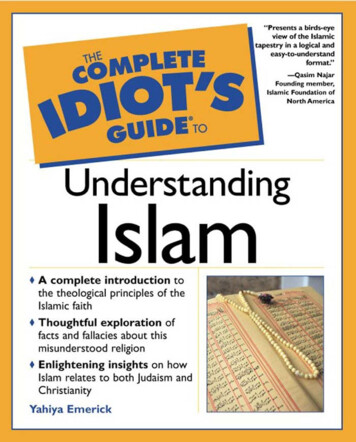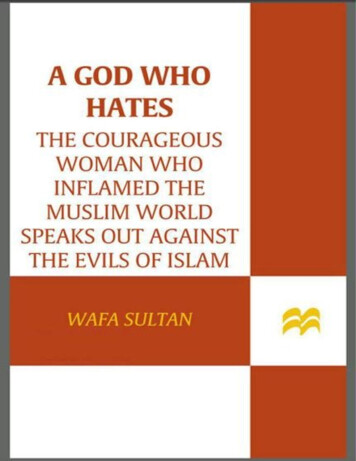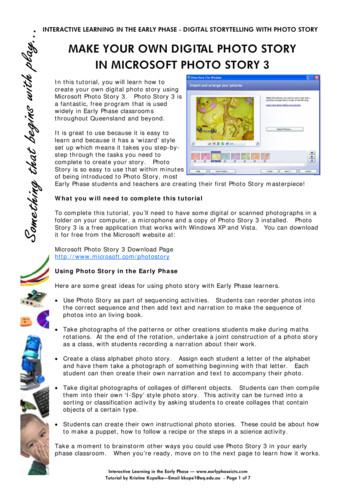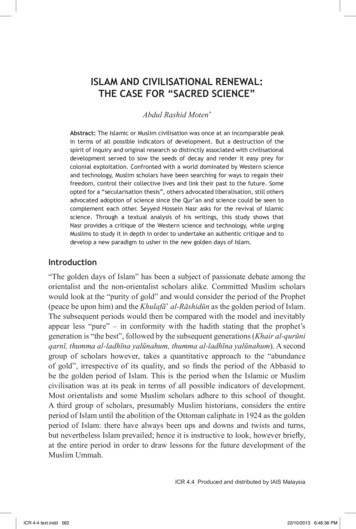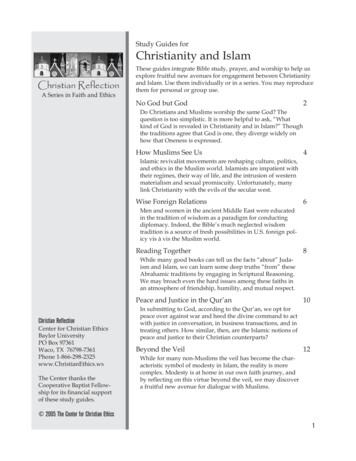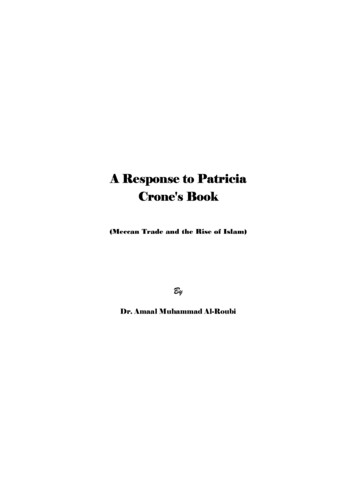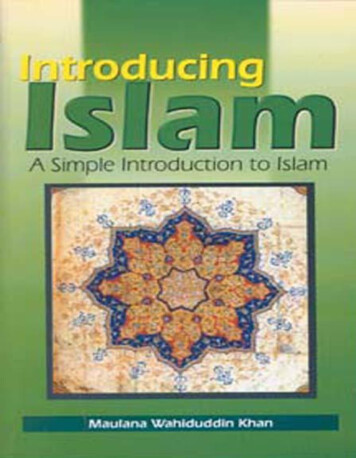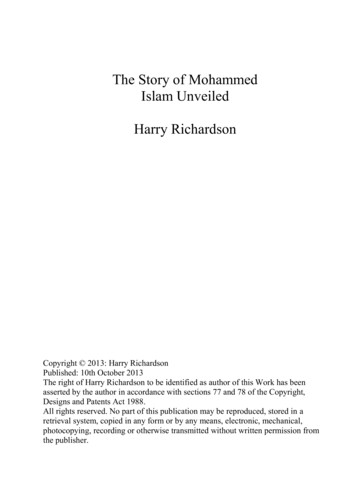
Transcription
The Story of MohammedIslam UnveiledHarry RichardsonCopyright 2013: Harry RichardsonPublished: 10th October 2013The right of Harry Richardson to be identified as author of this Work has beenasserted by the author in accordance with sections 77 and 78 of the Copyright,Designs and Patents Act 1988.All rights reserved. No part of this publication may be reproduced, stored in aretrieval system, copied in any form or by any means, electronic, mechanical,photocopying, recording or otherwise transmitted without written permission fromthe publisher.
This book is dedicated to all the people of the world,whatever their beliefs may be.AcknowledgementIn writing this book, I had the privilege of standing on the shoulders of Bill Warner ofthe Centre for the Study of Political Islam. Bill is not just an intellectual giant but atrue gentleman. I would therefore like to express my gratitude to him. I could not havewritten this book without his pioneering work.
IntroductionWhy would a non-Muslim want to read the story of Mohammed? For many Westerners, thelife of a self-proclaimed Prophet1, who died more than 1300 years ago in a remote part of theworld, might sound not only dull, but also completely irrelevant. In fact it is neither. During hislife Mohammed created a religious and political movement called Islam. A quarter of theworld’s population is now Islamic and it is the world’s fastest growing religion by far.Importantly, the influence of this religion currently stretches into more aspects of our societiesthan most of us realize.After studying Islamic doctrine and history, it soon became clear that the majority of what wehear about Islam’s goals and its influence on the actions and beliefs of Muslims, is entirelywrong. This lack of understanding has been the root cause of horrendous policy failures in areassuch as the “War on terror,” Middle Eastern foreign policy, the Arab- Israeli conflict etc. whichtend to dominate our daily news cycle.It is also clear that the reason for these failures is widespread ignorance of the doctrine ofIslam throughout all sections of Western society. This includes politicians, academics,journalists, teachers, right on down to the man in the street. Given the rapidly rising threats fromIslamic “extremists” and the growing number of conflicts involving Muslims, this would seem tobe a failure of epic proportions.It is for this reason that I have written this book. I wanted it to be widely read and so made itas simple and entertaining as possible. It is reasonably short and avoids dry theologicaldiscussion. If you have an interest in what lies behind the news stories we see every day, youshould find it both interesting and relevant.By the end, you should also have a good grasp of the doctrine of Islam. You will know whatthis doctrine expects of Muslims and how it affects the societies in which Muslims are living.Most importantly, this knowledge will give you a whole new understanding of issues involvingIslam. Conflicts around the globe, terrorism, immigration, treatment of women etc. can never beproperly understood without a basic grasp of Islamic doctrine.Islamic scholars have always known that the key to understanding Islam is the story ofMohammed’s life. This is good news, because Mohammed was an extremely interestingcharacter.Unlike any other prophet, Mohammed was also a political and military leader. He insistedthat Muslims should fight when called upon to put Islam in control of the whole world. Duringthe last nine years of his life, he and his followers were involved in acts of violent conquest onaverage once every seven weeks. By the time he died, he was the King of all Arabia with not asingle enemy left standing. The key to his success was a new system of warfare called Jihadwhich Westerners usually translate as “Holy War,” but which is in fact far more than this.More is known about Mohammed than any other religious leader2. Strangely however, evenin the Islamic world, few people know his story. This is not an accident. The life of Mohammedis the perfect example for all Muslims to follow. As such, it is the basis for the Islamic religion1Mohammed insisted that he was the final Prophet of Allah (God). People who believe him are called Muslims. People who don’t are callednon-Muslims (the Arabic word is “Kaffir”).2Centre for the Study of Political Islam
itself. You would expect then, that Muslims would be as familiar with Mohammed as Christiansare with Jesus. This is not the case however.Young Muslims are taught to recite the Koran in Arabic but are sternly dissuaded fromunderstanding its meaning. Four fifths of Muslims do not even speak modern Arabic, let alonethe archaic form the Koran is written in. Generally speaking, only those Muslims who arecommitted enough to want to become Islamic Religious leaders or “Imams” learn aboutMohammed’s life. The rest are expected to follow directions from these leaders who keep thisknowledge to themselves.Today, Muslim populations are exploding across the world as Western birth rates plummet.More than ninety percent of all wars and armed conflicts today involve Muslims. The greatmajority of terror attacks (more than twenty thousand just in the nine years since 9/113) are alsocarried out by Muslim Jihadists. The largest and most influential block of countries in the UN(despite their current lack of veto powers) are the fifty seven members of the Organization ofIslamic Cooperation. These nations also control the lion’s share of the planet’s dwindling oilreserves.In years to come these trends will almost certainly accelerate. This will give Islam increasingpower, not just in the lives of Muslims, but also in the lives of non-Muslims. Unbelievers willincreasingly find themselves constricted by laws and demands which reflect this growinginfluence. This expanding Islamic power and influence is going to affect you, your children andyour grandchildren. If you want to know, “how” and “why” then this book is the quickest andeasiest way to find out. For those seeking a more serious understanding of this complex subject,this book is an excellent first step. It will set you in the right direction and serve as a solidfoundation.Tony Blair, George Bush and most other world leaders, academics, journalists and opinionformers in the Western world insist that Islam is a religion of peace which has a few violentradicals, angry at Western foreign policy.Ayatollah Khomeini devoted his entire life to the study of Islamic doctrine. He became thespiritual and religious leader of the Islamic Republic of Iran and the foremost religious authorityfor the entire Shiite world (differences between Shia and Sunni Islam are fairly superficial). Hereis what he had to say about Islam and warfare.“But those who study Islamic Holy War will understand why Islam wants to conquer thewhole world. Those who know nothing of Islam pretend that Islam counsels against war. Those(who say this) are witless.”Read the story of Mohammed for yourself and see if you can figure out who is right.3http://thereligionofpeace.com
1 Early Life(If you think this book has been written to promote a sinister agenda or somehow encourageharm to Muslims, then please go to the end and read the appendix first.)Mohammed ibn Abdullah (The Prophet Mohammed) was born in 570AD, in a town calledMecca in what is now called Saudi Arabia. At that time Arabia was not a country, it was an areainhabited by a collection of tribes. It was and remains, a hot, dry and inhospitable landscapewhere people survived herding sheep and goats. Some dates were also cultivated in the North.Blood feuds were not uncommon. These would generally be resolved through the principle of aneye for an eye, a tooth for a tooth. Sometimes blood money would be paid to resolve a killing.Mecca was a holy town and a centre for all different kinds of religions. There was (and still is)a building named the Kabah which held a sacred stone. This is believed to have been ameteorite. There was also a well, whose water was thought to be holy and to have medicinalpowers. Tribes from all around Arabia would come to Mecca to worship their various deities.There were even a few Christians and Jews living there; it was very multicultural. Mohammedcame from the nobility of Mecca who were known as the Quraysh and his clan was known as theHashim. The main God of the Quraysh was Allah who is believed by many to be the Moon God,(which would explain why every Mosque has a crescent moon on top). Many other Gods werealso worshipped. Because it was a holy place, fighting was not allowed in Mecca. Violentdisputes had to be settled outside of the town.Mohammed's father died before he was born and his mother died when he was five. He wasthen raised by his grandfather, until he too died. His uncle, Abu Talib then took over his care.Abu Talib was a powerful member of the Quraysh. He seems to have been a kindly figure who,while he was alive, protected Mohammed and treated him well.The main business of the Quraysh was religion, though they also made money from trading.When he grew up Mohammed was hired by a wealthy widow named Khadija. She ran a businesstrading with Syria. Mohammed managed the caravans and did the deals with the Syrians. Syriawas a Christian country at that time and far more sophisticated and cosmopolitan than Arabia. Atthat time it was in fact, more sophisticated and cosmopolitan than most of Europe. The Arabstook their alphabet from the Syrian Christians. Writing was however, restricted to businesstransactions only. There were no books written in Arabic at that time. Religious traditions werepassed down by word-of-mouth. Christians and Jews were known as the people of the bookbecause they possessed written Scriptures. Mohammed did well as a trader and made a goodprofit for Khadija. After a while Khadija proposed marriage to him. They had four daughters andtwo sons together4.Because of his background, Mohammed was familiar with many different religions. He was ofcourse very familiar with the rituals of his own clan, the pagan Arabs of Mecca. Many of thesepagan rituals would be incorporated into Islam. There were also some Jews in Mecca and hiswife's cousin was a Christian. Since most religions were not written down, it was not uncommonfor people to have different versions of each religion, or even to start their own type of worship.Important Facts:To be a Muslim means to accept that Mohammed was the perfect Human Being. His life is theexample for all Muslims to follow in every way possible. Of course not all Muslims are verysuccessful in this endeavour but the level of devoutness of a Muslim is judged by how closely hefollows Mohammed’s example and teachings. This fact is not disputed in Islam. That is why it is4Only one of his daughters, Fatima survived to adulthood .
so important to know his story. There is even a word to describe Mohammed’s behaviour, whichis “Sunnah”Note:Some people may feel that this book should not be read for moral reasons. Before I go anyfurther I would therefore like to make something very clear. I am a huge fan of religiousfreedom. People should be allowed to believe what they want and worship in any way they seefit. If a group of Christians wants to worship in a weird or unusual way it doesn’t bother me onebit.If, however those people form a political organization and start trying to influence the waytheir society is run then I will likely take an interest. If I don’t agree with their political agendaor methods, I assert my right to criticize these activities. This is not a religious criticism; it is apolitical criticism.This book is not overly concerned with religious aspects of Islam. We will not be investigatingits religious beliefs or practices too deeply. What I will be commenting on are the politicalobjectives, political agenda and political methods of Islam. These are clearly laid down inIslamic Doctrine. How Muslims interact with each other or interact with their chosen Deity is areligious matter. That doesn’t interest me at all. How they interact with non-Muslims, (who theyrefer to as Kaffirs) is a political matter and does concern me. As this story unfolds you will soonsee why.BibliographyThe original source of most of this material is Ibn Ishaq’s book, Sirat Rasul Allah (The Story ofthe Prophet of Allah) or just The Sira. Ibn Ishaq is the most revered and trusted Muslim scholarof all time. This work was compiled around 100 years after Mohammed’s death which makes ithis oldest surviving biography. It is the absolute definitive biographical account of Mohammed’slife for Islamic scholars.It was translated into English in 1955 by Professor of Arabic, Alfred Guillaume, under the titleThe Life of Muhammad with the help of a number of Arab professors. This is still the mostwidely used English translation for both Muslims and non-Muslims.This direct translation has been superbly simplified and rearranged, by Bill Warner of theCentre for the Study of Political Islam. He has included material from other well trusted sources.This gives clarity and context to a story which previously took enormous amounts of painstakingstudy to understand. The title of his book is Mohammed and the Unbelievers. Most of the quotesused will come from this book (which is referenced back to The Sira by a system of marginnumbers contained in the original text).
2 Islam is FoundedWhen he was around Forty years old, Mohammed started to take month-long retreats, to prayand to perform the religious practices of the Quraysh. He began to have visions where he wasvisited by the Angel Gabriel. He said that Gabriel would teach him scriptures. Gabriel then toldhim to recite these scriptures so he could teach them to his followers. These would later bewritten down by his followers and were compiled after his death into what is known today as theKoran. His wife Khadija supported him and became the first convert to the new religion ofIslam. In Arabic Islam means “submission”. Khadija was soon joined by Mohammed's adoptedson and other family members. Eventually some other people outside of the family joined themtoo. As Mohammed gained followers he became more confident. Soon he began to preach quiteopenly from his new religion.In the beginning this did not cause a problem. The Quraysh were very tolerant of differentreligions as that was how they made their money. For them, more religion meant more money. IfMohammed's new religion brought in more people to worship, it would be all the better.Things soon began to sour however, as the tone of Mohammed's teachings became steadily lesstolerant. Mohammed began to teach that his religion was the right one (which was okay) but thatall the other religions were false (which was not). He mocked the other religions and ridiculedtheir Gods. What was even worse for the Quraysh, was Mohammed’s claim that because theirancestors were not Muslims, they were burning in hell. For the Quraysh whose ancestors weresacred, this was intolerable. They begged him to stop doing this and return to promoting his ownreligion without rubbishing theirs.When he refused, the Quraysh wanted to kill him. Unfortunately for them, Mohammed stillenjoyed the protection of his powerful uncle, Abu Talib. The Quraysh tried to offer his uncleinducements. They wanted him to hand over Mohammed so that they could kill him, but hesteadfastly refused.Mohammed was clearly a charismatic preacher who gradually gained more followers. Thisincreased the divisions within the community. There were quarrels and constant bickering.Mecca was a small town and everybody knew each other’s business.What had once been a peaceful and profitable community was now split badly, between theQuraysh and the new converts who were known as Muslims (which means those who havesubmitted).Some of the less powerful Muslims and especially slaves who had converted, were treatedquite badly by the Quraysh. Fortunately for them, Mohammed's uncle was able to protect themall from serious harm. Some of the Meccans who converted were also among the strongest andmost powerful members of the community. It gradually became harder for the Quraysh to doanything about Mohammed. Although he had called them stupid, insulted their gods and claimedthat their ancestors were burning in hell, they were unable to stop him.The Quraysh tried to reason with Mohammed and even tried to cut him a deal. They offeredhim money, or even the leadership of the tribe, if he would just stop his preaching. Mohammedrefused, insisting that he was only the messenger of Allah and had no choice in the matter.Author’s Comments:Before I get too far into Islam, I want to give a very brief overview of Christianity. Like it ornot, if you grew up in a “Western” country then your ethics, your sense of right and wrong, arebased upon Christian teachings, as are the laws which our society makes.People who grow up in different cultures may have a different definition of what is right andwrong. To give an example, what a Viking might have considered to be “the right thing to do,”would probably be seen as seriously anti-social in modern day Denmark.
Islam has a set of ethics. In order to explain these ethics I will sometimes be comparing them toChristian ethics. This is not because I’m promoting Christianity but because most Westerners,(including myself) understand it far better than for instance Hinduism or Buddhism.The basis of Christian (and Jewish) ethics is the Ten Commandments which we are allprobably familiar with. Don’t steal, cheat, lie, kill, covet etc. These are then capped off with theGolden Rule which is:“Do unto others as you would have them do unto you.”From the Golden Rule are derived the other principles of freedom of speech, the rule of law,equality, tolerance etc. which underpin the laws and customs of most Western countries.Growing up in a society based on this Golden Rule, we tend to believe that it is universal and noteven remotely a radical idea. Keep in mind however, that the man who popularized this idea2000 years ago, got nailed to a tree for it.Despite this, the idea gained currency and continued to spread. By the time of Mohammed’sbirth, Christianity was the dominant religion throughout most of the Middle East, North Africaand Europe.The Golden Rule and the Ten Commandments however, ARE NOT the basis for every religionand society. As you will soon find out they are definitely not the basis of Islam.Islam is difficult to explain clearly. In some ways, it is a bit like a giant jigsaw puzzle. I couldshow you a single piece of a jigsaw and tell you for instance, that it is a tiger’s nose. Although itmight not look like a tiger’s nose, it is not until you see it surrounded by the other pieces thatyou can tell what it really is. Some of the things I write may seem strange, or even ridiculous tosomeone who has grown up in a Western country with Christian based ethics. Hopefullyhowever, by the time you finish this book you will be able to see each piece in the context of thewhole picture.
3 Islam GrowsMohammed stayed in Mecca for thirteen years after declaring himself a prophet. The first halfof the Koran was written during this time and is known as the Koran of Mecca. The revelationsin the Meccan Koran tell repeatedly that Mohammed is the Messenger of God and that all thosewho disbelieve him will burn in hell. There are also stories of people from the past who rejectedtheir prophets. These people were consequently destroyed and are now burning in hell.According to Mohammed, many of the biblical characters such as Abraham, Moses and evenJesus (who he claimed was not the Son of God but a prophet) were Muslims. No mention of theIslamic religion has ever been found which pre-dates Mohammed however. He further claimedthat he was the last in the line of these prophets and that the Koran was God’s final message.The Koran takes a number of stories from the Bible and retells them quite differently, in orderto make a different point. In this retelling, the message is always about how the Jews ignoredtheir prophets and were then punished by God.This is the religious part of the Koran, which contains the biblical stories and religious themes.Mohammed used these basic themes quite skilfully to answer most of the questions his criticsput to him.Mohammed was obviously quite charismatic and very self-confident. He also had the ability topackage his message in a quite beautifully poetic form. The first half of the Koran is writtenpoetically, which also makes it easier to memorize. Consequently he attracted quite a number offollowers and as his power grew, so did his desire for it. He was extremely narcissistic andseemed to care only for the adoration of others. The fact that he tore apart his home town andeven his own family did not seem to bother him.When his uncle lay dying he went to his bedside and asked him to accept Islam. His unclemuttered something and then died. Mohammed's companion said that he thought his uncle hadaccepted Islam. Mohammed did not hear him clearly however and declared therefore that hisuncle would burn in hell. Abu Talib had raised him from being a child. He then secured him hisfirst job which led to his successful marriage. Later, he protected Mohammed from all thetrouble which he had created himself. Because he had refused to submit to Islam however,Mohammed declared that he was burning in hell.That year his wife Khadija also died. He married a widow named Sauda and was betrothed to asix-year-old girl named Aisha who was the daughter of his most ardent follower.Important facts:Muslims obviously believe that Mohammed was the final Prophet of Allah. From a nonMuslim viewpoint however, he was simply a genius who designed and defined Islam for asingular purpose; to make the whole world worship him (or to worship Allah through him whichis pretty much the same thing).To do this, he made sure that Islam could never be changed. Mohammed insisted that to be aMuslim, a person must declare that there is no God but Allah and Mohammed is his prophet(there are four other “pillars” of Islam but this is the most important by far). This is thedefinition of what it means to be a Muslim. Mohammed also declared himself to be the lastprophet of Islam. In doing so, he cleverly prevented anyone from hijacking his religion down thetrack.Despite claiming to be the last in the line of Jewish prophets he also ensured that the Jewscould have no claim on his religion. Mohammed insisted that the Jews (and Christians) hadfalsified their Bible. He said that this was to hide the fact that he had been prophesied in the realBible (there is no evidence to support this claim). He also forbade Muslims from reading theBible or the Torah (Jewish Bible). Muslims therefore can only read about Biblical prophets such
as Abraham or Moses through Mohammed’s retelling. This is often quite different, sometimesillogically so, from the original Bible stories.The point to all this is that Mohammed is not just a central figure in Islam, Mohammed ISIslam. In Churchill’s day, Muslims were referred to as Mohammedans, (people who followMohammed) which is a fairly accurate description. To be a Muslim is to believe thatMohammed is the perfect man and that the Koran, as revealed to Mohammed only, is the perfect(and only) word of Allah. A true Muslim therefore follows the words of Allah (as found in theKoran) and the example, or traditions of Mohammed (which are recorded in his biographies).This clever design of Islam means that it can never be changed. The Koran can’t be changedbecause it is the perfect word of Allah. Mohammed’s life can’t be changed because he’s dead.Muslims are incredibly serious about how perfect the Koran is. To give an example of this,several chapters of the Koran start with three Arabic letters. No one knows what this means butthey will never be removed because the Koran is perfect and unalterable.To summarize then; Islam is Mohammed, Islam has never changed, Islam will never change.To change Islam, you would have to take Mohammed out of it and then it wouldn’t be Islam anymore. As Barry Sheene so eloquently put it,“If my uncle was a woman he’d be my [word deleted] Aunty.” It is a logical absurdity.Christianity changed and evolved because it is based on broad principles, such as the goldenrule, which can be debated and interpreted. There isn’t much to debate with Mohammed, heeither did something or he didn’t. People who think that Islam should, or even could change aretherefore likely to be disappointed.
4 Emigration to MedinaOnce a year, people from all over Arabia came to Mecca for a religious fair. Many of thembegan to hear of Mohammed and wished to hear him preach. In this way he gained newfollowers from outside of Mecca. One group came from Medina, which is a town to the North ofMecca.Medina contained five tribes, three were Jewish and two Arab. The Jewish tribes weregenerally better educated and wealthier. There were quarrels between the Arab tribes and alsobetween Arabs and Jews. This had spilled over into bloodshed.Some of the Medinan Arabs who had converted to Islam invited Mohammed and his followersto come to Medina. They thought that he might be a unifying influence who would bring peaceto their tribes.The next year when the annual fair came around again, Mohammed took the Medinans to ahillside outside of Mecca, called Aquaba. There he had them swear an oath to him, whichbecame known as the Oath of Aquaba. This oath included a promise to fight to the death in theservice of Mohammed. In return for this, he promised them paradise. This was the first time thatMohammed's teachings included the threat of killing; it is also the beginning of the Islamiccalendar.The Quraysh soon heard about this and hatched a plot to kill Mohammed. They figured that ifthey did not take action now, he would return from Medina with an army and make war on them.Mohammed's followers had mostly left for Medina already and his uncle had died. Now he hadno one to protect him. Mohammed heard of the plot and fled Mecca. He hid in a cave for threedays until the heat had died down and then continued on the 10-day trip to Medina.Author’s Comments:At this point in time Mohammed had been a prophet for 13 years. He was slightly more thanhalf way through his career as a religious leader. He had acquired around 150 followers, themajority of whom were poor and uneducated and had made many powerful enemies.Mohammed had made many threats to his enemies, (i.e. anyone who would not accept that hewas God’s only prophet) about punishments in the afterlife. His teachings however, wereessentially of a religious nature. In other words, they were about how Muslims should interactwith Allah, or with other Muslims. They were not however, political in nature (how Muslimsshould interact with non-Muslims). Islam has a habit of dividing things in two. The Koran is noexception and is divided into two separate halves. There is the Koran of Mecca, which is mostlyreligious and the Koran of Medina, which is essentially political in nature.In the last chapter I laboured the point that Muslims are obliged to follow Mohammed’steaching and traditions. I would like to add some important caveats here, because you may soonbe thinking something like “I know a Muslim who doesn’t do that” or “how come most Muslimsdon’t do that.”1) Not all Muslims follow their religion devoutly any more than followers of any otherreligion. Some are very devout but many are not. A Muslim may behave in a way whichis against the teaching of Islam such as drinking alcohol. This doesn’t mean that Islampermits drinking alcohol. It just means that not everyone follows the rules all the time.Islam can affect Muslims but Muslims cannot affect Islam.2) Muslims are supposed to follow the example of Mohammed. There are however, anumber of different ways in which Mohammed behaved in order to achieve his aims.These methods depended largely on the circumstances. If I wanted to be kind I woulddescribe him as “opportunistic.” I’ll be explaining this in more detail down the track as it
is important. Whilst many Muslims do not follow Mohammed’s more unpleasantmethods, most of them seem to share his goals.3) Muslims in general are very ignorant of the details of their religion, this is not anaccident. Most Muslims don’t speak Arabic and yet their books are written in an archaicform of it. Islamic scholars insist however, that these books cannot be translated. This isjust one reason why, until recently, it was incredibly difficult to understand these books,(or even to know which books were important) unless you were taught by Islamicscholars.
5 Sharia Law and the Koran of MedinaRight from the start, things were different in Medina. Mohammed already had a number offollowers there. Once his followers from Mecca joined him, he had a sizeable group. Included inthese were some of Mecca’s fiercest warriors. Importantly, unlike the Meccans, the clans ofMedina were already deeply divided amongst themselves. Because the Muslims were preparedto stick together, Mohammed became the most powerful man in Medina. The Medinan clansalso gave him the power to mediate disputes believing that he would be a good, neutralarbitrator.Mohammed soon set about consolidating this power. He built a Mosque and a compoundnearby for himself, his followers and his growing number of wives. He wrote a charter whichwas to be the basis for the law of Medina. This law was based on two different sets of rules. Oneset of rules would apply to the Muslims and a different set of rules would apply to the Kaffirs(non-Muslims). These rules became known as Sharia Law.Mohammed divided the world into the Muslims, who believed in him and the Kaffirs, who didnot. Now this division was set down in law and became the basis of the Islamic religion.All Muslims were henceforth to be members of a nation known as the Ummah. They werebound to help all other Muslims, especially
the archaic form the Koran is written in. Generally speaking, only those Muslims who are committed enough to want to become Islamic Religious leaders or "Imams" learn about Mohammed's life. The rest are expected to follow directions from these leaders who keep this


